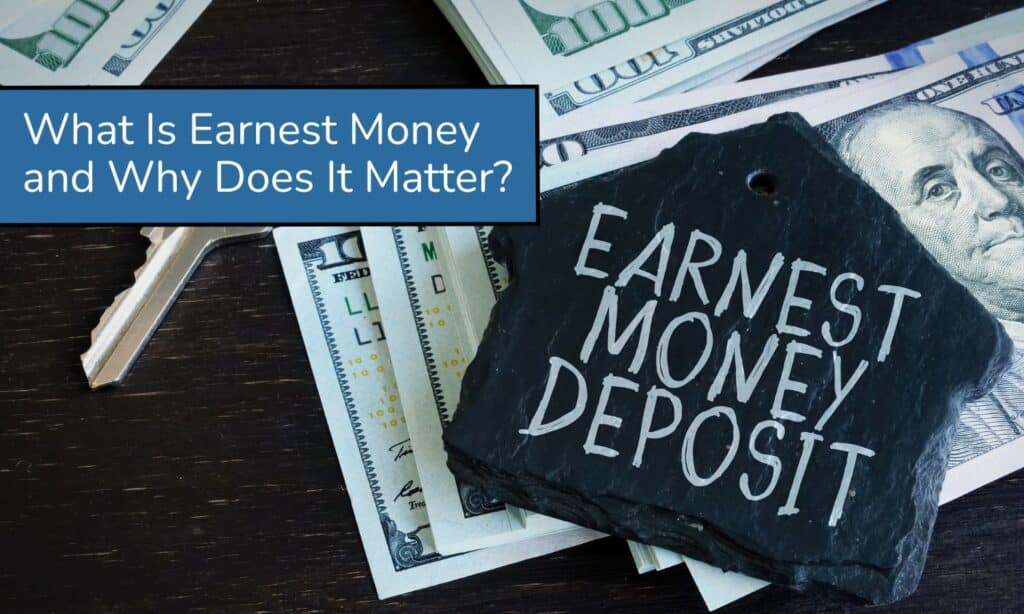Buying a home is an exciting milestone—but it also involves many moving parts. From securing financing to scheduling inspections, each step plays a role in getting to the closing table. One of the earliest and most important pieces of the puzzle is earnest money. Whether you’re a first-time buyer or a seasoned homeowner, understanding earnest money can help you navigate the offer process with confidence and avoid surprises along the way.
In today’s competitive Tri-Cities real estate market, offering earnest money is more than just a formality. It can be the deciding factor that makes your offer stand out to sellers.
What Is Earnest Money?
Earnest money is a deposit made by the buyer to show they are serious about purchasing a home. Think of it as a gesture of good faith—when you submit an offer, including earnest money signals to the seller that you’re committed and not just testing the waters.
The amount typically ranges from 1% to 3% of the home’s purchase price. For example, on a $400,000 home, a buyer might offer $4,000 to $12,000 in earnest money. The exact amount can vary based on market conditions and the seller’s expectations.
This deposit is usually submitted shortly after the seller accepts your offer. It’s then held in an escrow account until closing, at which point it’s applied to your closing costs or down payment.
How Earnest Money Works
Once both parties have signed the purchase agreement, the earnest money is deposited into an escrow account managed by a neutral third party—typically a title company or brokerage. This ensures the funds are protected while the transaction moves forward.
At closing, the earnest money is applied directly toward your costs—either reducing your down payment or covering part of your closing expenses. It’s important to note that earnest money is not the same as your down payment; it’s a separate deposit made earlier in the home buying process to demonstrate your intent to buy.
If everything goes smoothly, the earnest money becomes a credit toward your home purchase. But if the sale falls through, what happens to the money depends on the terms of your contract—a topic we’ll explore in the next section.
Why Earnest Money Is Important
In a real estate transaction, earnest money plays a critical role in building trust between buyers and sellers. When a seller accepts your offer, they’re agreeing to take their home off the market and begin the process of closing the sale. That means turning away other potential buyers. Earnest money shows that you’re serious about following through—and that you’re financially prepared to do so.
In competitive markets like the Tri-Cities, earnest money can also strengthen your offer. Sellers are more likely to accept an offer with a solid earnest money deposit, especially when there are multiple offers on the table. It’s a tangible way to show that you’re not just interested—you’re committed.
Plus, having earnest money in escrow helps protect both parties. It gives the seller some peace of mind while offering the buyer certain protections if the sale doesn’t go through for valid reasons outlined in the contract.
What Happens to the Earnest Money?
If the deal closes
The earnest money is applied to your final closing costs or down payment. You’ll see it as a credit on your settlement statement—it’s your money, just being used toward the total amount you need to bring to the table.
If the deal falls through
What happens next depends on why the deal didn’t close—and what contingencies were in place.
- Buyer-protected situations: If your purchase agreement includes contingencies (like a financing contingency, home inspection, or appraisal), and you cancel the contract for one of those valid reasons within the agreed timeframe, your earnest money is usually refunded.
- Unprotected situations: If the buyer backs out without a contractual reason—say, cold feet or a missed deadline—the seller may have the right to keep the earnest money as compensation for lost time and opportunities.
This is why it’s so important to work closely with an experienced real estate agent. They can guide you through the process and ensure all the terms and timelines are crystal clear.
Protecting Your Earnest Money
Earnest money is a valuable part of your home purchase—so it’s important to protect it. The best way to do that is by including clear contingencies in your offer. These are conditions that must be met for the sale to move forward, and they offer legal protection for your deposit.
Common contingencies include:
- Financing Contingency: Protects you if you’re unable to secure a mortgage loan.
- Home Inspection Contingency: Allows you to renegotiate or walk away if major issues are found.
- Appraisal Contingency: Ensures the home’s value aligns with the agreed-upon price, which is important for your mortgage lender.
In addition to contingencies, it’s crucial to stick to all deadlines in your contract. Missing key dates—like the deadline for securing financing or scheduling inspections—could put your earnest money at risk.
Finally, make sure your earnest money is always held by a reputable escrow agent, such as a licensed title company or brokerage. Never hand it directly to the seller.

Common Questions About Earnest Money
Is earnest money required for every offer?
Technically, no—but in most cases, sellers expect it. In competitive markets, not including earnest money can weaken your offer.
Can you negotiate the amount?
Yes. While 1%–3% of the purchase price is standard, you can offer more or less depending on the situation. A larger deposit may help you stand out in a bidding war.
What if the seller backs out?
If the seller defaults on the agreement, the buyer is typically entitled to a full refund of their earnest money. The seller may even have grounds for legal action, depending on the circumstances.
What if multiple buyers are interested in the same property?
In a multiple-offer scenario, sellers often compare both the price and terms of each offer—including the amount of earnest money. A strong earnest money deposit can tip the scales in your favor.
Final Thoughts
Earnest money might seem like a small part of a big transaction. But it plays a powerful role in building trust and securing your offer. It tells the seller you’re serious, it gives you an edge in a competitive market, and it can help protect your interests throughout the process.
At the Kenmore Team, we’re here to make sure every step of your homebuying journey is clear and confident—including the details that matter most, like earnest money. If you have questions or are ready to make an offer on a home in the Tri-Cities, reach out today. We’ll guide you every step of the way.


